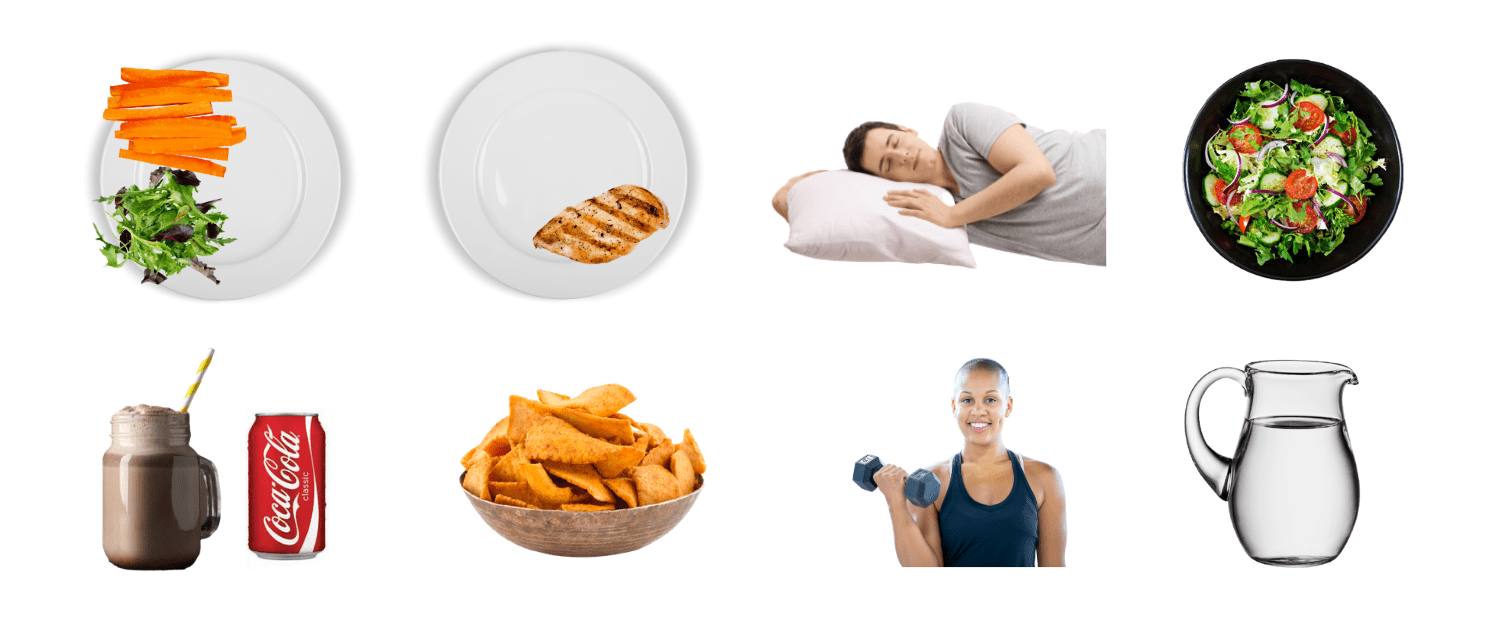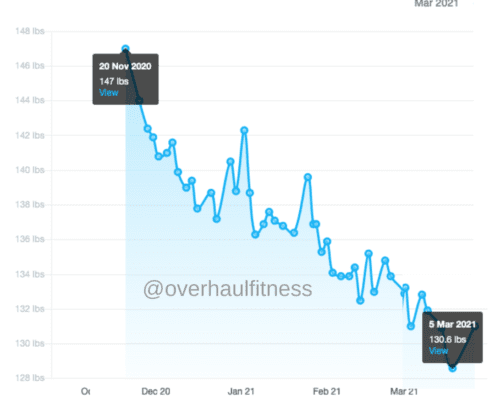8 Ways to Lose Weight Without Counting Calories
Jun 17, 2020 by Jackie Lindal
Read time: 2 minutes
Tracking your calorie intake is a great way to understand what & how much you are eating in order to achieve your weight loss goals. However, you may find that calorie counting and tracking can be tedious. For many, it is a struggle to constantly be tracking every bite they eat.
While it’s true that you need to achieve a calorie deficit to lose weight, counting calories isn’t always required.
If calorie tracking isn’t for you, and you’re interested in alternative approaches, here are some simple rules & guidelines you can follow to help cut down on calories without even having to count calories – like with MyFitnessPal, for example.
1. Half A Plate Veggies
Filling up at least half of your plate with vegetables is not only a great way to get more fibre, vitamins, minerals & nutrients in your diet, but you will do all of that for fewer calories. Having the majority of your plate filled with vegetables will give you a boost of good nutrition and keep you full. This means you can eat a large volume of food for your meals while keeping calories in check at the same time.
2. Protein at every meal
Protein is imperative for building & maintaining muscle mass but also is key to keep you feeling satiated (feeling of fullness) for hours after your meal. Many times when you are struggling with the urge to eat an hour after a meal is because of a lack of protein in that meal. A good guideline to follow is to have a serving of protein that’s approximately the size of your palm at each meal. This is approximately a 3-4 oz serving of protein which is anywhere from 20-30g on average depending on the source.
3. Sleep 7+ hours per night
Sleep is very undervalued in today’s society. We are commonly forgoing sleep for extra work, Netflix, etc. One of the biggest ways sleep can help in regards to weight loss is to give you more “emotional control” over food. When you’re lacking sleep you often reach for quick and easy options, which tend to be less healthier food options.
Sleep also leads to better rest & recovery, not only for your brain but also for your body & muscles. Proper sleep (7-9hrs per night) will give you more energy, better brain function and decision making so you can feel more inclined to get your workouts in, eat healthy food for your body and recover faster.
4. 1 Big Salad per day
Similar to point #1, having 1 large salad every day helps you maximize the nutrient density and decrease the caloric density of the food you’re eating – like shown in this Instagram post. Knowing that you’re going to eat 1 large salad per day also simplify’s your meal planning for the day and prevents some decision fatigue on what to eat. What it comes to making salads, stick to leafy greens, cut up fruit and veggies, some protein (eg. chicken), and a little dressing (calorie-wise if possible).
5. Minimize Sugar added beverages
Drinks you have throughout the day are a sneaky way to add calories that you don’t always pay attention to. High sugar drinks such as pop, juice, coffees or tea (with added cream & sugar) add up quickly throughout the week and can easily push you out of a calorie deficit. Swapping these drinks out for either zero calorie/sugar-free alternatives or water helps to cut down on unnecessary sugar and calories.
6. Minimize Snacking
Just like how drinks can add up calories throughout the day, so can snacks.
Little snacks and bites add up and often, we are unaware of how much we are actually consuming. Many times we find ourselves in the cupboard before or after dinner searching for a snack we don’t really need. To break the unnecessary snacking, focus on having good quality meals throughout the day that make you feel full and satisfied and snack only when you are truly hungry, rather than out of boredom.
7. Weight Training & Regular Exercise
Regardless of your goals, regular exercise and weight training should be a part of your regular routine. Weight training 3-5x per week helps to build & maintain muscle mass, increase bone density and helps you to burn more calories throughout the day. On top of weight training, regular exercise such as walking, biking, swimming, etc, is helpful to stay active, moving and burning more calories.
8. Drink enough water.
Just like exercise, drinking enough water is crucial, regardless of your goals. Water intake helps to not only make sure we are properly hydrated, but it helps to reduce cravings and eating out of boredom. Often times, when we feel like snacking, but aren’t actually hungry, simply drinking 1-2 glasses of water, helps to reduce those cravings. Keep a water bottle with you at all times to stay hydrated throughout the day.
If tracking calories is not for you, or you aren’t sure where to start for your weight loss goals, these are simple rules you can use to help you eat healthier and burn more calories. By making these simple changes, you’re reinforcing bringing in good habits and practices into your life, rather than focusing on restricting and taking things away.
Interested In Being A Client?
Click Here and fill out a quick interest form and we’ll be in touch!
Or…Stay In Touch
Join everyone else that we email, no more than once per month, to keep in touch about recent blog posts, new workout programs, meal plans and recipes to try, and more…






